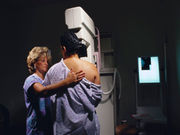Increased risk of TNBC among African-American women with prior diagnosis of benign breast disease
THURSDAY, Dec. 29, 2016 (HealthDay News) — African-American (AA) identity is associated with increased risk of triple-negative breast cancer (TNBC) among women with a prior diagnosis of benign breast disease (BBD), according to a study published online Dec. 22 in JAMA Oncology.
In a retrospective analysis of data from a cohort of 2,588 AA and 3,566 white American (WA) women with a biopsy-proven BBD diagnosis, Lisa A. Newman, M.D., M.P.H., from the Henry Ford Health System in Detroit, and colleagues examined whether AA identity is associated with TNBC among women with a prior diagnosis of BBD.
The researchers found that 4.1 percent of AA patients (mean follow-up interval, 6.8 years) and 4.0 percent of WA patients (mean follow-up interval, 6.1 years) developed subsequent breast cancers. In each subset, more than three-quarters of subsequent breast cancers were DCIS or stage I. The 10-year probability estimate for developing TNBC was 0.56 percent (95 percent confidence interval, 0.32 to 1.0 percent) and 0.25 percent (95 percent confidence interval, 0.12 to 0.53 percent) for AA and WA patients, respectively. Among AA patients who developed subsequent invasive breast cancers, 16 of 66 developed TNBC, compared with seven of 94 of the WA patients who developed subsequent invasive breast cancers and had complete biomarker data (24.2 versus 7.4 percent; P = 0.01).
“This study is the largest analysis to date of TNBC in the context of racial/ethnic identity and BBD as risk factors,” the authors write. “This finding suggests that AA identity is associated with inherent susceptibility for TNBC pathogenetic pathways.”
Full Text (subscription or payment may be required)
Copyright © 2016 HealthDay. All rights reserved.








